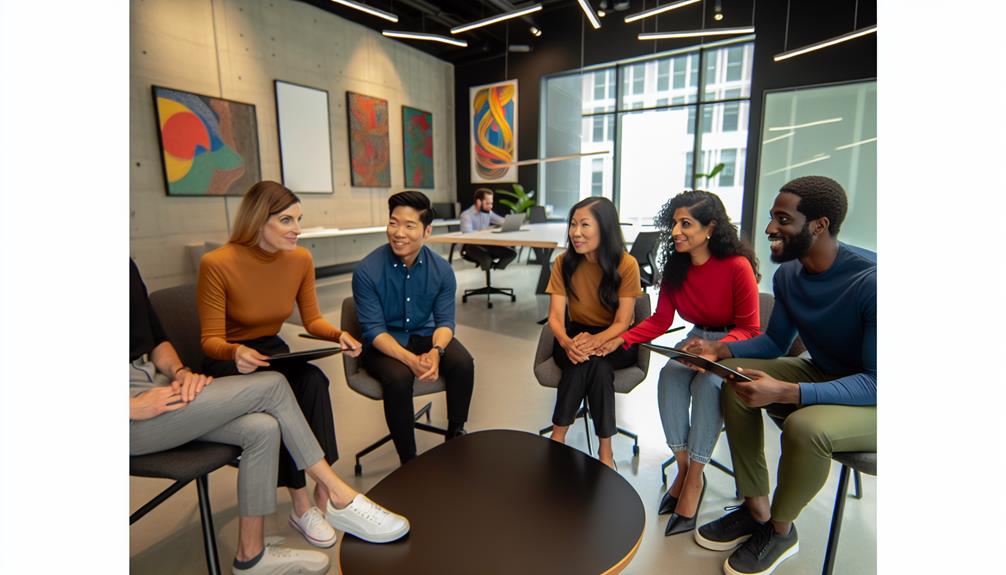To apply for internships in the USA, start by understanding visa requirements, like the F-1 or J-1 visa. Tailor your resume and cover letter to highlight relevant skills, and gather strong recommendations. Use job search platforms like LinkedIn and attend career fairs for opportunities. Network with professors and classmates to find leads. When preparing for interviews, practice common questions and dress professionally. Adapt to the workplace culture you encounter, and keep track of your experiences to maximize your internship. Exploring these strategies can set you up for success as you pursue valuable opportunities.
Key Takeaways
- Obtain the necessary visa (F-1 or J-1) and consult your designated school official for guidance on compliance with U.S. immigration laws.
- Tailor your resume and cover letter to highlight relevant skills, and ensure all application materials are error-free and professionally formatted.
- Utilize job search platforms like LinkedIn and Handshake, and attend career fairs to discover internship opportunities.
- Network actively with professors, classmates, and industry professionals to build connections and gain insights into potential internship roles.
- Prepare thoroughly for interviews by researching common questions and practicing responses, while also dressing professionally and asking insightful questions.
Understanding Visa Requirements
When applying for internships in the USA, understanding visa requirements is vital for international students. Typically, you'll need either an F-1 or J-1 visa. If you hold an F-1 visa, you can participate in Curricular Practical Training (CPT) after your first academic year. This option is great for study-related internships. Alternatively, Optional Practical Training (OPT) allows you to work full-time for up to 12 months after graduation, with a 24-month extension available for STEM graduates.
On the other hand, the J-1 visa is specifically designed for interns and cultural exchange. If you're applying for a J-1 visa, you'll need to obtain Form DS-2019 from an authorized sponsor. After that, you must pay the SEVIS fee and complete the Online Nonimmigrant Visa Application.
Regardless of the visa type, it's important to comply with U.S. immigration laws. For any questions about the visa application process or necessary documentation, consult your designated school official (DSO). They're there to guide you through any complexities and make sure you're on the right track to secure your internship.
Crafting Your Application Materials
Crafting your application materials is a crucial step toward landing an internship. Start with your resume, tailoring it to highlight relevant skills and experiences specific to the internship role. Keep it concise, ideally one page, and avoid personal details like photos or marital status. Next, write a compelling cover letter that complements your resume. Align your qualifications with the job responsibilities and showcase any additional achievements not listed in your resume.
Don't overlook the importance of letters of recommendation. Prepare strong letters from professors or previous employers who can vouch for your skills and character, as they can greatly enhance your application. Make certain all your application materials are error-free and professionally formatted. Use a suitable email address for contact, since clarity and presentation matter.
Lastly, gather any required academic transcripts for the internship application. Some companies may request this documentation to verify your educational background. By focusing on these elements, you'll present a polished application that reflects your professional goals and readiness for the internship role.
Job Search Strategies

Finding the right internship can feel overwhelming, but using effective job search strategies can streamline the process. Start by utilizing platforms like LinkedIn and Handshake to discover internship opportunities that match your career goals. These sites not only list openings but also allow you to network with professionals in your desired field.
Make the most of your on-campus resources by attending career fairs and networking events. These gatherings provide a fantastic chance to connect directly with employers actively seeking interns. Don't forget to engage with professors and classmates; they can provide valuable leads and recommendations within their professional networks.
When applying, create a tailored resume and cover letter for each application. Highlight your relevant skills and experiences that align with the internship role. Additionally, conduct thorough research on companies and their internship programs. Understanding their mission and values will help you prepare targeted application materials that resonate with employers.
Preparing for Interviews
Preparing for interviews is a crucial step in securing an internship. To excel in your internship search, start by researching common interview questions, especially behavioral questions. These will help you articulate your skills and experiences effectively during the interview process. Practice your responses through mock interviews or with peers to build confidence and guarantee clear communication.
Dress professionally, reflecting the company culture, and prepare an appropriate portfolio if applicable. This highlights your work and achievements, making a positive impression on the interviewer. During the interview, be ready to discuss your relevant skills and experiences that align with the job requirements. Highlight how you can contribute to the organization.
Moreover, develop insightful questions to ask your interviewers about the role, team dynamics, and company culture. This illustrates your genuine interest in the position and helps you assess if it's the right fit for you. Remember, preparation is key. By understanding the expectations and dynamics of the interview, you'll present yourself as a strong candidate ready to tackle the challenges ahead. Good luck!
Navigating Workplace Culture

When you step into a new internship, understanding the workplace culture is vital for your success. Start by observing communication styles; in the U.S., these can range from direct to indirect. This awareness will help you steer interactions and build relationships effectively. Pay close attention to the level of formality in meetings, as some industries may favor a casual atmosphere while others require a more structured approach.
Engaging with colleagues, both in person and through social media, offers valuable insights into the company's culture and can ease your cultural adaptation. Recognize that American work culture values independence and proactivity. By demonstrating these traits, you can contribute positively and stand out during your internship experience.
Embrace mistakes as learning opportunities; this mindset is vital for growth in a professional setting. Being resilient and open to feedback fosters better team dynamics and helps you integrate smoothly into the workplace culture. By taking these steps, you'll not only adapt to your new environment but also maximize the impact of your internship. Remember, your approach to steering workplace culture can set the tone for your entire experience.
Maximizing Your Internship Experience
To truly maximize your internship experience, it is essential to set clear goals that align with your career aspirations. By establishing specific objectives, you'll enhance your focus and guarantee your efforts contribute meaningfully to your development. Actively seek feedback from supervisors throughout your internship; this will help you identify areas for improvement and enhance your skill set.
Networking is another important aspect of maximizing your experience. Engage with colleagues and industry professionals to build connections that could lead to future job opportunities. These relationships can be invaluable in your career development.
Keep a detailed record of your experiences, achievements, and skills learned during the internship. This documentation will prove invaluable for your future job applications and interviews, showcasing your growth and capabilities.
Lastly, take the time to reflect on your internship experience after it's over. Assess your personal growth and identify areas for further development. This reflection will help you prepare for your next career steps and guarantee you're continually moving toward your goals. By following these strategies, you can truly maximize your internship experience and lay a solid foundation for your future.
Building Professional Networks

Maximizing your internship experience naturally leads to the importance of building professional networks. Networking is essential for finding internship opportunities, especially since 70% of jobs are found through connections. Start by utilizing LinkedIn to expand your professional network. With 87% of recruiters using the platform, it's an indispensable tool for connecting with industry professionals, alumni, and peers.
Attend industry-specific networking events and career fairs. Studies show that 58% of employers prefer candidates who've made personal connections. These settings allow you to meet potential mentors and gain insights into your field. Don't overlook your professors and guest lecturers; they often have valuable connections and can provide referrals for internships.
Joining professional organizations related to your field can also be beneficial. Through these memberships, you'll find shared job openings and internship opportunities, increasing your visibility in the industry. Engaging with these networks not only enhances your chances of landing internships for international students but also provides you with valuable experience that can shape your career path. Start building your network today to open the doors to future opportunities!
Frequently Asked Questions
How to Apply for Internships in the Us?
To apply for internships, start by researching opportunities that fit your career goals. You'll need to create a tailored resume and a compelling cover letter for each application. Gather strong letters of recommendation to boost your chances. Make sure you complete the application process well before deadlines, including all necessary documents. Finally, follow up with employers after submitting your applications to show your interest and make a memorable impression.
How Do I Go to the USA for an Internship?
To go to the USA for an internship, you'll need to secure the right visa, like the J-1 or an F-1 with CPT or OPT. Start by researching internship opportunities that match your career goals. Once you find one, prepare your application materials, including a tailored resume and cover letter. Don't forget to connect with your university's career services and consult your designated school official about visa requirements and compliance.
Can a Foreigner Do an Internship in the Us?
Yes, you can do an internship in the U.S. as a foreigner. To get started, you'll need the right visa, like the F-1 or J-1. If you're on an F-1 visa, you can use Curricular Practical Training (CPT) or Optional Practical Training (OPT) after your studies. J-1 visa holders can explore internships through Academic Training (AT). Many U.S. companies welcome international students, offering valuable experience in various fields.
How to Search Internships in the Usa?
To search for internships in the USA, start by utilizing online platforms like LinkedIn and Glassdoor. Check your university's career services for tailored listings. Attend job fairs and networking events to meet employers directly. Investigate companies' websites for specific internship programs and application requirements. Don't forget to leverage social media to stay updated on industry trends and company cultures. This approach will enhance your chances of finding the right opportunity.
